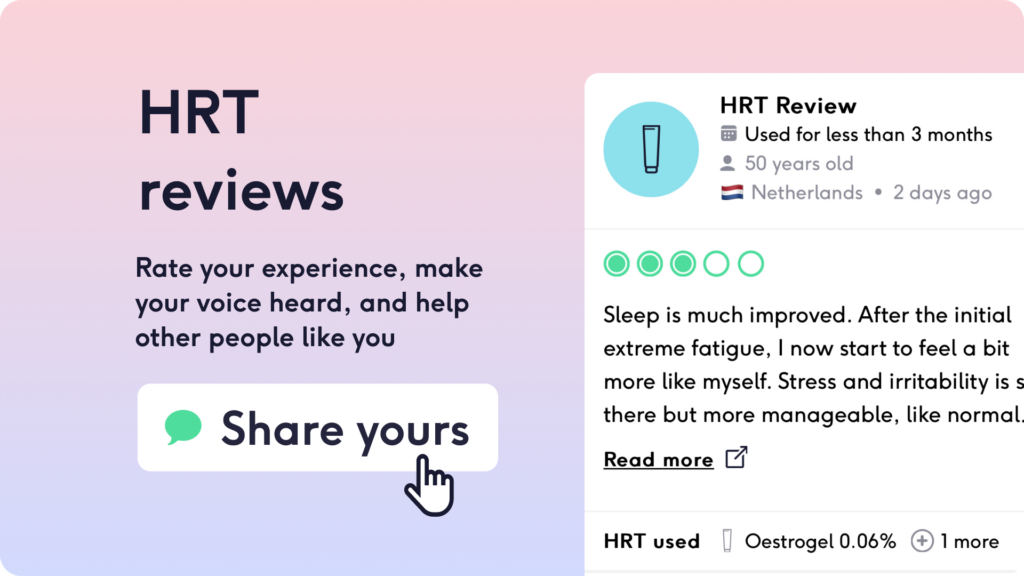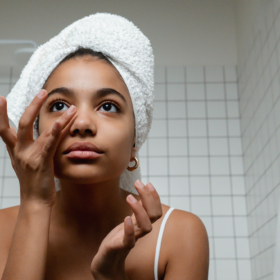
Why is my vagina dry?
In this article
What's the lowdown?
Vaginal dryness has numerous causes but it can be related to low oestrogen
Painful sex, an itching vagina and a painful or burning vulval area are all symptoms of vaginal dryness
Oestrogen containing topical creams and gels have been found to improve symptoms of vaginal dryness, are relatively safe and easy to use and may not be needed permanently
If you have other concerning symptoms, are worried that your vagina is too dry or you’re just not sure, talk to a doctor about your symptoms.
As vulva and vagina owners, most of us are used to having something or other coming out of us at any given time – blood, coils, babies, discharges of a variety of sight, smell and colour… the list goes on. But at the opposite end of the spectrum about 20% of pre-menopausal women in the UK suffer from vaginal dryness.
Your vagina relies on a variety of factors including hormonal and bacterial harmony to be at its best! Arguably, the most important of these is oestrogen, the get up and GLOW hormone that makes you look and feel great, and has similar effects on your vagina. Oestrogen assists with keeping the lining of the vagina elastic, thick and well lubricated. All the boxes we’d like ticked!
Causes of Vaginal Dryness
Hormones & Ageing
Once the process of perimenopause begins, our production of oestrogen naturally (and annoyingly) drops, often along with progesterone, which is why more than 30% of perimenopausal and postmenopausal women in the UK complain of vaginal dryness. However, the real statistics may be even higher as symptoms such as pain during sex and vaginal itching tend to be under-reported.
Vaginal dryness is often a symptom of vaginal atrophy or atrophic vaginitis, which more recently has been termed ‘genitourinary syndrome of the menopause’. This is where due to age related oestrogen changes, the lining of the vagina becomes thin, dry and inflamed, causing a variety of symptoms related to the vulva, vagina and urinary tract. Studies have shown this affects around a whopping 70% of postmenopausal women. Often vaginal atrophy and vaginal dryness are used synonymously.
Hormones & Childbirth
Childbirth and breastfeeding can also drop your oestrogen levels due to the differing demands and requirements of your body and newly born baby. Oestrogen levels steadily increase throughout pregnancy and rapidly drop once your baby is born.
The hormones responsible for breast milk production then increase in peaks and troughs for production to be maintained if needed over your baby’s first few years of life.
These hormones (oxytocin and prolactin) keep your oestrogen levels suppressed which may lead to symptoms such as vaginal dryness, but also prevent your menstrual cycle from bouncing back immediately after delivery (which is why breastfeeding can be used as a contraceptive method).
Contraception
Hormonal contraception (containing oestrogen and/or progestogen such as the combined oral contraceptive pill could also affect vaginal lubrication, potentially leading to vaginal itching or yeast infections. If this is the case for you, there are alternative options available which may be less likely to cause this side effect or don’t contain any hormones at all. We recommend comparing contraception methods to find your fit!
Medical treatments and conditions
If you’ve had chemotherapy or radiation treatment this can affect how much hormone your ovaries are producing as these types of life saving treatments often knock-out part, and sometimes all, of the functionality of surrounding structures. This can range from mild changes to ovarian insufficiency and early menopause. Similarly if your ovaries have been removed you’ll have a lower oestrogen supply and a higher chance of vaginal dryness.
Medications used to stop the production of oestrogen (for example used to decrease fibroid size or help with symptoms of endometriosis) can lead to unwanted vaginal dryness. Allergy and cold medication (such as antihistamines and decongestants) can dry your vagina and some antidepressants have also been found to have a side effect of vaginal dryness too.
Autoimmune conditions such as Sjogren’s syndrome and diabetes can also cause you to have vaginal dryness. Sjogren’s syndrome causes glandular swelling and malfunction leading to a dry mouth, dry eyes and, you guessed it, dry vagina.
In the case of diabetes, vascular damage due to elevated blood sugar levels can cause an array of complications and unfortunately the blood vessels supplying the vagina aren’t spared. This decreased blood flow to the vagina in turn may decrease lubrication. Other conditions, such as inflammatory bowel disease, multiple sclerosis and stress can be associated with vaginal dryness.
Vaginal ‘hygiene’ products
So-called ‘vaginal hygiene’ practices (that are definitely not recommended), such as douching, may also upset the delicate balance that is the vaginal microbiome, the good bacteria that keep the vagina healthy. This could lead to dryness and discharge and mean you’re more susceptible to pH and bacterial imbalances, and possibly infections.
Symptoms of Vaginal Dryness
Okay, so we know oestrogen is important and that there are many ways it can be affected but how do you know if you have vaginal dryness?
Symptoms include:
- Feeling itchy around your vulva: The skin and tissue here is one of the most sensitive areas of our body. Millions of nerve endings send signals from every inch of you and so if something is off, your body is going to let you know
- Feeling soreness or pain around your vulva: Burning is often a term used to describe the type of pain
- Pain during or after sex : This is considered ‘superficial dyspareunia’, relating to pain around the vulva and vaginal entrance.
- Light bleeding after sex: This is due to small breaks in the fragile vaginal tissue – think cracked and dry skin – which may bleed.
- Urinary symptoms: The tissues around the urinary tract are also sensitive to hormonal changes. Symptoms include increased frequency (needing to pee more often), urgency (needing to pee NOW), dysuria (painful pee) and nocturia (waking up at night to pee). Urinary tract infections are commonly linked to vaginal atrophy and dryness.
How to treat vaginal dryness
Make friends with lube
For some of us, the only treatment needed for vaginal dryness may just be a bit of lubricant more foreplay ahead of sex! (Louder for the oblivious partners at the back!) Get some Yes water-based lube from Amazon (we earn a small commission from this link!)
We also have an amazing sexual health team The Lowdown who can help with contraception and hormones and sex-related concerns.
Oestrogen cream
Persisting vaginal dryness will require treatment in one form or another. This may involve addressing the root cause, such as reviewing your contraception, or treatment for a medical condition. In lots of cases, all we need to do is replace what’s missing – oestrogen. The good news is that treatment is simple, affordable, well researched and effective!
For post menopausal women this can be done in a few ways, but an easy and safe way is through vaginal creams or gels containing oestrogen; delivering the hormone right where you need it most. Other options include vaginal pessaries and rings containing oestrogen.
Oestrogen creams can also be safely used alongside as well as systemic hormone replacement therapy known as HRT.

Oestrogen applied to the vagina is a safe and effective treatment. It’s really important to be aware that the patient information packaged with vaginal hormone preparations is out of date and factually incorrect. The British Society for Sexual Medicine has highlighted this needs to be changed by the Medicines and Healthcare Products Regulatory Agency, until then you have us to keep you in the loop!
For premenopausal women oestrogen cream may be recommended by your healthcare professional, depending on the suspected cause for vaginal dryness. However in premenopausal women oestrogen cream is considered ‘off licence’ and so will need to be prescribed by your doctor.
It is important to note that oestrogen should be carefully considered for some users with specific past medical histories and/or risk factors. If you have a history of hormonally sensitive cancers in the breasts, ovaries and endometrium, or aren’t sure if you might be at risk, speak to a doctor before starting any hormonal-based treatment.
Some lubricants and unscented moisturisers may also help manage vaginal dryness and can be used alongside or instead of vaginal oestrogen. Moisturisers should be used regularly, whereas lubricants can be used for sexual activity.
How oestrogen cream can help with vaginal dryness
Oestrogen creams and gels are specifically made to increase your levels of oestrogen where they’re needed most – right up in there! Formulations directly applied to the vagina and vulva allow for oestrogen absorption through the vaginal tissue and all the good stuff should spring back into action – elasticity, thickness, lubrication – aka the holy grail.
Oestrogen creams applied directly to the vagina are a very low dose compared to systemic HRT.
How long does it take oestrogen cream to work?
It usually takes a few months to see benefits from using vaginal oestrogen which can be safely used long term. For the majority of postmenopausal women unfortunately symptoms often return after treatment is stopped. However, vaginal dryness for some may be temporary, not permanent! Creams or gels containing oestrogen may need to only be used in your low oestrogen phases or to bridge the gap during a dip in your natural hormone levels until they spontaneously resolve.
What to do if your vaginal dryness persists or gets worse
If you’ve been on every form of treatment possible and you are still not winning with your vaginal dryness, there may be an underlying cause.
Abnormal bleeding (especially after sex) can be a sign that something isn’t right. ‘Abnormal’ may be when a little occasional post-sex bleeding turns into a lot of bleeding, or if you’re constantly having blood stained discharge. If you think this is you, or you aren’t sure, chat to your GP.
Dryness with thick, white discharge (the worst of both worlds) may be caused by vaginal thrush. Look out for cottage cheese-like discharge while also feeling very dry and itchy. Similarly, a thin yellow or grey watery discharge is indicative of bacterial vaginosis, which disrupts and elevates your vaginal pH alongside vaginal dryness.
These can often be easily identified and treated by a doctor, but can also be signs of a sexually transmitted infection (STI) so it may be worth getting a test if you’re at risk – especially if your symptoms persist or get worse.
Almost 100% sure you have vaginal dryness but don’t know where to start with fixing it? We have incredible GPs at The Lowdown on hand to help with any questions as well as further information on oestrogen creams to help you get out of the drought ASAP.
Our medical review process
This article has been medically reviewed for factual and up to date information by a Lowdown doctor.





